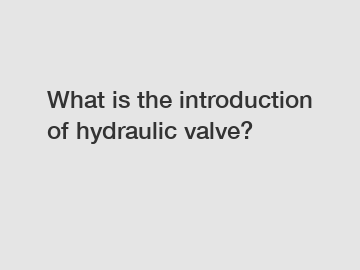Feb. 05, 2024
Mechanical Parts
A hydraulic valve is an essential component in hydraulic systems, enabling control and regulation of fluid flow. It is designed to direct and control the flow of a hydraulic fluid within a hydraulic system. This crucial component plays a significant role in various industries, including construction, manufacturing, and aviation.
Understanding the Functionality of Hydraulic Valve.
Hydraulic valves are designed to handle high-pressure environments, making them suitable for applications that require precise control over fluid flow. These valves can regulate the flow of hydraulic fluid, change its direction, and maintain pressure levels within the system.

The primary function of a hydraulic valve is to control the flow rate and pressure of fluid, ensuring safe and efficient operation. By adjusting the valve's position or the flow rate, operators can regulate the speed of hydraulic actuators or other hydraulic components. This allows for precise control over equipment such as hydraulic cylinders, motors, and pumps.
Different Types of Hydraulic Valves.
There are several types of hydraulic valves, each with its specific application and operational characteristics. Here are some common types of hydraulic valves:
1. Ball Valves: These valves have a spherical disc inside that controls the flow of fluids. They provide swift shut-off and can handle high-pressure applications.
2. Check Valves: Check valves allow fluid flow in one direction and prevent backflow. They are commonly used to ensure fluid flows in a specific direction and maintain pressure.
3. Control Valves: These valves regulate the amount and direction of fluid flow. Control valves are often used in hydraulic systems, allowing operators to adjust speed, direction, and force.
4. Directional Control Valves: As the name suggests, directional control valves determine the direction of fluid flow within a hydraulic system. They enable operators to control the movement of hydraulic cylinders or motors.
5. Pressure Control Valves: These valves maintain consistent pressure levels within a hydraulic system, preventing potential damage caused by excessive pressure. Pressure control valves ensure the system operates within safe limits.
Importance of Proper Maintenance and Installation.
To ensure optimum performance and reliability, hydraulic valves require proper maintenance and installation. Regular inspections, cleaning, and lubrication can prolong the lifespan of hydraulic valves. Any signs of wear or leakage should be addressed promptly to prevent system malfunctions and downtime. In addition, correct installation, including precise alignment and proper sealing, is crucial for the optimal functioning of hydraulic valves.
Conclusion.
In summary, hydraulic valves are essential components in hydraulic systems, serving critical functions in controlling fluid flow, pressure, and direction. With various types of valves available, operators can select the most suitable valve for their specific application. Proper maintenance and installation are vital for the longevity and efficient operation of hydraulic valves.
If you have any further questions or require assistance with hydraulic valves, please feel free to contact us. Our team of experts is here to help you find the most suitable solutions for your hydraulic system.
Contact us to discuss your requirements of electromagnetic directional valve manufacturer, wholesale plate check valve, Proportional Valve Overflow Valve. Our experienced sales team can help you identify the options that best suit your needs.
If you are interested in sending in a Guest Blogger Submission,welcome to write for us!
All Comments ( 0 )